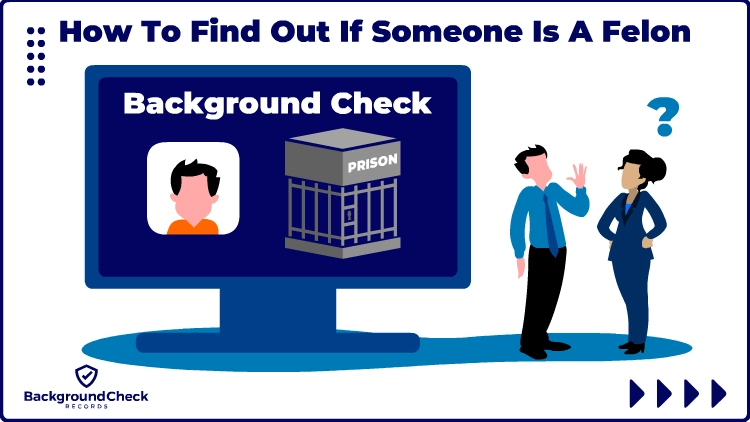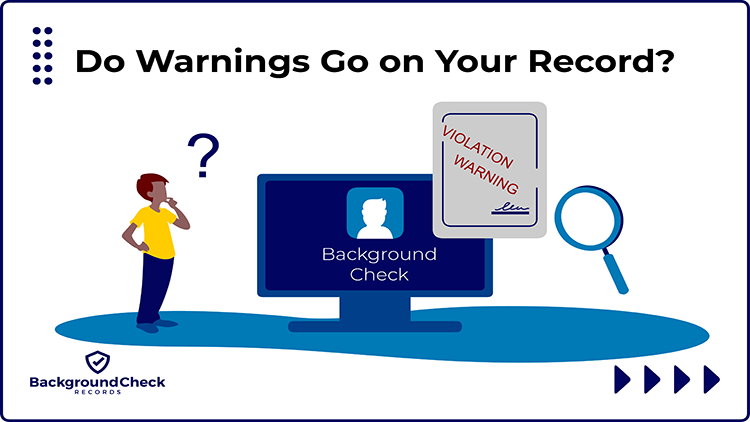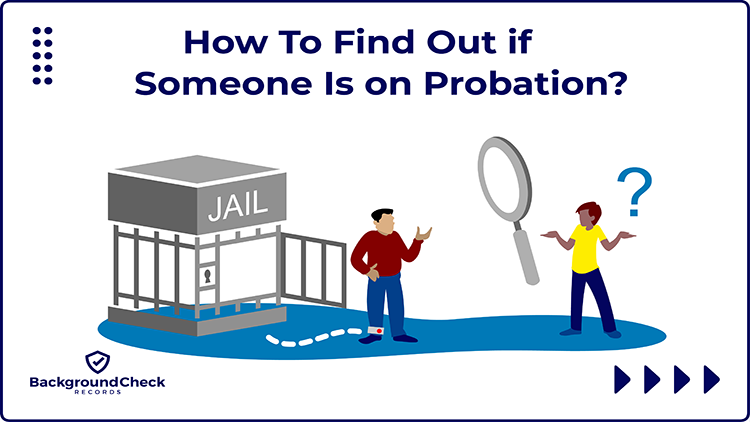Free: How To Find Out if Someone Is a Felon, See Criminal Records
Discovering if someone is an offender for free and see their entire criminal history by searching felony records on the local, state and federal level.
Of course, some felonies, like domestic violence, for example, are worrisome, but felony driving infractions may not be as concerning. In either case, this free guide shows searchers how to see a person’s felony criminal records and other charges, so they can understand more about their past and determine if that’s the type of person they’d like to associate with — whether that’s in their day-to-day life, romantically, or at work.
Note, when looking for someone’s criminal history for professional purposes (i.e. when hiring, apartment background checks, licensing etc.), searchers must abide by the Fair Credit Reporting Act.
Information Needed To Look Up Someone’s Criminal History
When searching someone’s record to see if they have a felony, there is some information necessary to make sure the records returned match the subject and are accurate. The more information available at the onset of the search, the more likely the report or record is the right one.
The following items are needed to make a felony record search:
- Subject’s full name (first and last minimum, but a middle name will help narrow the search even more),
- Any aliases,
- Date of birth or age,
- Subject’s address,
- Location of the arrest (city, county or state),
- Date and time of arrest if known (an approximate arrest date can help locate the record),
- Law enforcement agency that made the arrest.
As stated earlier, the more information available at the beginning of the search, the more likely the search results will reveal the required information and match the subject.
Felony records are considered public records, and it’s easy to find out if someone is a felon by accessing these records. More on this is discussed in the next section.
Discovering If Someone Is a Felon by Searching Public Records (Free Methods)
Since a felony record can alert the public that a person is a potential threat to the general population, knowing which public records to search for felony records is vital. Felony convictions that have not been sealed or expunged are considered public records, and can be accessed by anyone in any state.1
There are several places to look when attempting to find out if someone has a felony and this is because there are various record custodians in each state, county, city or jurisdiction. Plus, some records are stored on the federal level.
The information below should only be used for personal curiosity and professionals must use a background service that abides by the Fair Credit Reporting Act.
By the end of this readers will know how to check local and federal court records, local and state law enforcement databases, the Bureau of Prisons inmate roster that retains historical data, the sex offender registry and more to determine if someone is a felon or not.
Note, not all inmates have felony convictions, some are habitual misdemeanor offenders and it’s important to note that not all sex offenses are felonies, but still require registration.2, 3
Look Up Court Records on Someone or Yourself
Court records, both federal, state and local records, are considered public unless they have been specifically sealed or expunged by a court, or release of them violates a law or statute. Individuals can look up court records on themselves and others.
To search for federal court records, do the following:
- Open the United States Courts PACER website.
- Hover the cursor over the box labeled: Search for a Case and select the search criteria from the menu that appears.
- If the searcher doesn’t have an account, the person must register to use PACER. If the person does have an account, they will be prompted to login to conduct the search.
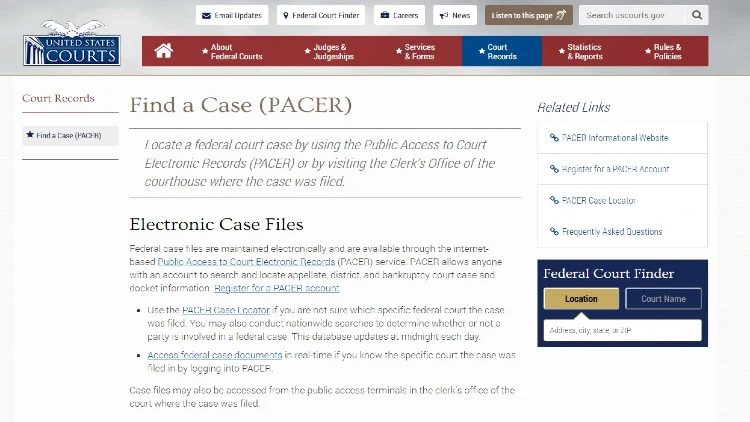
There is a small fee of $0.10 per page to view records through PACER. If the searcher lives or works near the federal court where the case was tried, the person can go to the courthouse to view the record free of charge using a public terminal maintained by the clerk of court.4
There are some states that have a statewide court record lookup system anyone can access online to see if the subject has a record in that state. The table below lists the states that have an online court access portal for reviewing felony records:
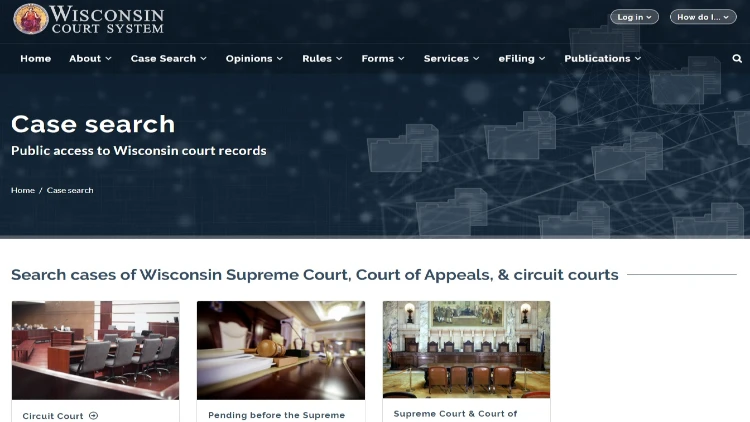
The court systems in the states mentioned offer a free criminal background check through the state’s court system for anyone wanting to discover if someone they know has been convicted of a felony in that state.
For states that do not have a statewide court record search feature, individuals should do the following:
- Open google and type in “[City or County] court records search.” For example, if you’re in Dallas Texas you’d search “Dallas court records search”
- From there, look for .gov and .org websites primarily, but it may be on a .us or .com as well. The first result that populated was the Dallas County website
- Now look for something along the lines of “criminal records search” or “felonies.” For the Dallas example, the next link you’d click on is “Dallas County Felony and Misdemeanor Courts Case Information“
- Now simply search by their first and last name.
Note, sometimes you may have to check the top few websites to find the best way to access local county records because again, the record custodian could be the state, the county, the courthouse or another government entity.
Check Historical Data From the Bureau of Prisons (BOP)
Individuals convicted of federal felonies receive a prison sentence housed by the United States Bureau of Prisons and they keep historical data from 1982 to the present day.
To search federal prison records, do the following:
- Open the Bureau of Prison website federal inmate by name link.
- Key in federal prisoner search in the search bar.
- From the top 3-4 items in the search returns, click the link for the official government website. For this search, it would be the Bureau of Prison federal inmate by name link.
- Enter at minimum the person’s first and last name. Searchers can also add race, sex and age if that information is available.
- Click search to see if there are any hits on that person’s name.
- Click on the record to see details about the inmate.
It is important to note that the Bureau of Prison’s search results include both active inmates and those that have been incarcerated in a federal facility in the past. Records prior to 1982 are not included in the online search portal and must be requested by submitting a FOIA request to the Bureau of Prisons.
The record also just shows the date the person was released (if no longer incarcerated) or the location of the inmate, not details about the offense.5
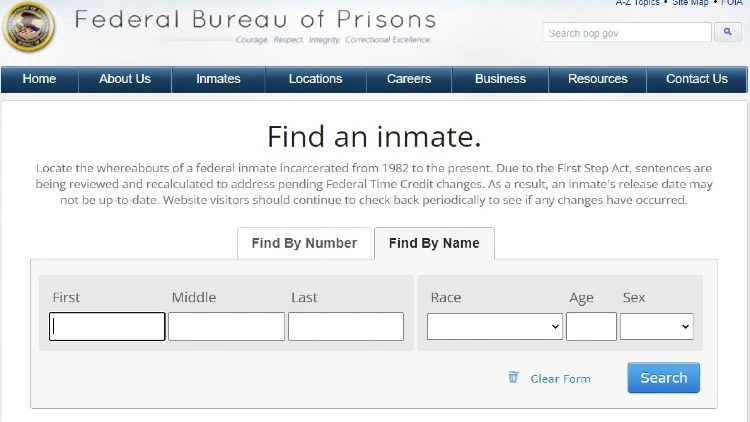
State inmates can be located using a statewide criminal history search which includes felony convictions and whether or not the person was incarcerated for the offense, placed on probation or has been released on parole. The next section outlines how to search statewide criminal history for felony records through the state-level law enforcement agency.
Run a Statewide Criminal Record Search
Many states have statewide criminal history searches through the state police or a similar entity like the Bureau of Investigation, and the public can request records using convicted felon registry resources.
For convenience, we have built a table below that lists the state law enforcement agencies that provide criminal history along with a link to the search portal and information on costs associated with the search:
To search for a state criminal history report, do the following:
- Open a search engine of choice such as Google on the computer.
- Type “[state name] criminal history search.” For example, to search records in Massachusetts the person would type Massachusetts criminal history search.
- Review the search returns to find the official (.gov) website for that state’s law enforcement agency that does official background checks, and click that link. For the example listed above, this will take searchers to the Massachusetts government criminal records page.
- Follow the on-screen instructions for requesting a background check or criminal history.
While these searches are not free, they are a way to see if someone is a felon in that state. There are other ways to search for felony records other than the courts or the state police systems.
Check State, County & City Law Enforcement Databases
It is possible to look up felony records through local county or city law enforcement databases, which may store that information themselves or send it to the law encforcement agency above them such as the County Sheriff’s Office or State Police.
To search felony records using local law enforcement repositories, follow these steps:
- Open Google, Bing or another search engine of choice.
- In the search bar, type “criminal record search [the city or county you live in].”
- Review the top results in the search returns for the agency’s official website. For example, typing ” criminal record search New York” will lead to the NYPD Records Request page as the top search result, and further down on the list is the NY State Division of Criminal Justice Services criminal history report page. Either page can be used to do a felony record search in NY.
- The agency site will list how to obtain records from the department (or have a link to an online portal to search records). The agency may also publish recent or daily arrests which can show if someone was charged with a felony.
For example, a search of the inmates at Harris County Jail, the largest county in Texas, shows whether or not someone is in jail. Clicking on the inmate’s name reveals if that person has been charged with a felony.6
A search of the Los Angeles, California, Police Department site provides information on how individuals can request a copy of arrest summaries or incident reports that list the offenses the defendant has been charged with.7
Other searches on local or state agency sites include warrant searches to see if someone is wanted by the police for a felony charge. Local agencies usually provide only information on that specific area or jurisdiction.
Another resource for statewide criminal records is the state’s sex offender registry discussed in the next section.
Review the Sex Offender Registry
One of the more heinous felonies a person can be charged with is a sex offense, and each state maintains a public sex offender registry that allows anyone to perform a name-based inquiry to see if a person is a registered offender. Searching the sex offender registry is another way of learning if someone is an offender.
For convenience, the table below links readers to the registry site for each state in the United States in addition to the National Sex Offender Registry website:
These state sex offender registries were found using the steps below:
- Open Bing or Google on the computer.
- Type “sex offender search and [state name].”
- Review the top 1-3 search results for the official state website. For example, typing sex offender search California will lead to California’s Megan’s Law page.
- Read any disclaimers or notifications on the website, then navigate to the search form.
- Enter the offender’s name to see if that person is on the registry.
Check Drug Offender Registries
In addition to sex offender registries, some states have public drug offender registries.
To search for a state drug abuse registry, do the following:
- On the computer, open a search engine such as Google.
- Type “drug offender registry and [state name].”
- Review the top 1-3 results for the official state site. The official site typically ends in .gov, but some state sites may end in .us. For example, when typing drug offender registry Tennessee, searchers will be directed to the Tennessee Drug Offender Registry landing page.
- Click the link to determine if the registry is open to the public, or if it is just available to law enforcement or doctors and pharmacists. The Tennessee registry is public, so clicking on the search registry link will direct users to the Drug Offender Registry Database.
- For registries that are open to the public, enter the subject’s name and other pertinent information to see if they are listed on the registry.
For example, the Tennessee Bureau of Investigation maintains the Tennessee Drug Offender Registry online search where individuals can see who has been charged with felony drug offenses in the state.
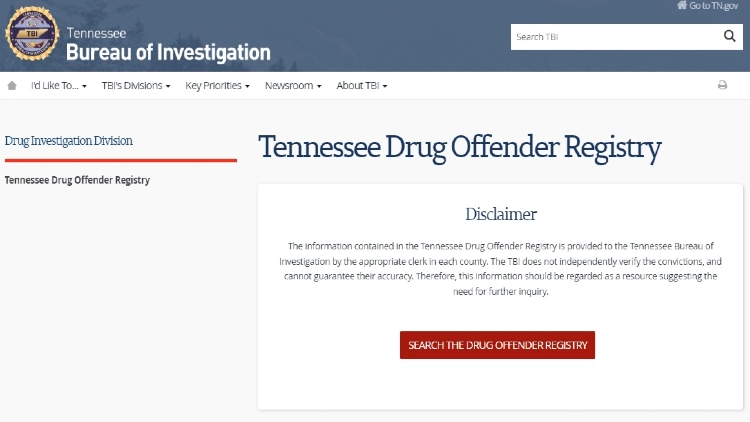
Minnesota also maintains a methamphetamine registry with an online search link that can be used by anyone regardless of whether they are in Minnesota or another location. Searches can be done by name, or the searcher can look at all the registered methamphetamine offenders in each county.8
Another state with the Public Offender Registry in Kansas which is incorporated in the state’s sex offender registry. Searchers can choose to search for both types of criminal offenses or just designate drug or sex offenses.
Montana maintains the Montana Sexual Or Violent Offender Registry as part of its sexual or violent offender registry.
Finally, Illinois also maintains an Illinois State Police Convicted Methamphetamine Manufacturer Registry for methamphetamine offenders in the state. There are other ways to find out if a person has been convicted of a felony offense in a state by searching the sanctions list maintained by the Office of Foreign Assets Control (OFAC) under the United States Department of the Treasury.
The Department of the Treasury maintains the Office of Foreign Assets Control (OFAC) to track foreign nationals who may pose a threat to overall national security in the United States. These include individuals who have committed felony offenses against American citizens, are suspected of terrorist activity or association, or pose an intellectual threat to US assets, and can be discover if someone is an offender.
To search the OFAC registry, do the following:
- Open the OFAC website.
- Fill out as much information as available on the form that appears and click the search button. At minimum add the subject’s name to conduct a search.
Searches will show if the person is on the OFAC list, and clicking the name will show why the person has been placed on the sanction list, what city they are from and the country, and the person’s date of birth.
Conducting searches can help determine if someone is a felon, but there are laws that help protect those who have served their sentence and are trying to re-enter society. These laws are outlined in the next section.
Laws To Protect Convicted Felons & Discrimination
A felony conviction does not necessarily mean a person is unsuitable for a position or housing, and felony charges that resulted in a non-conviction should not be used as a roadblock to hiring someone. There are a number of laws that are designed to protect individuals with a criminal record from unlawful hiring practices, and are as vital as learning if someone is a felon.
The Fair Credit Reporting Act (FCRA) primarily deals with credit history; however, commercial background check agencies are also limited to a seven year lookback period for any non-convictions including felony charges.
By limiting what agencies can access, it gives individuals with a felony non-conviction on their record a chance at employment.
The Equal Employment Opportunity Commission (EEOC) also helps ensure individuals with a felony record are not being treated in a discriminatory manner when it comes to hiring decisions. For example, the EEOC provides guidelines to agencies on how to use criminal and arrest records when making hiring decisions, and enforces anti-discrimination laws when a criminal history is used to disqualify otherwise qualified applicants who are unequally disadvantaged by certain felony laws.
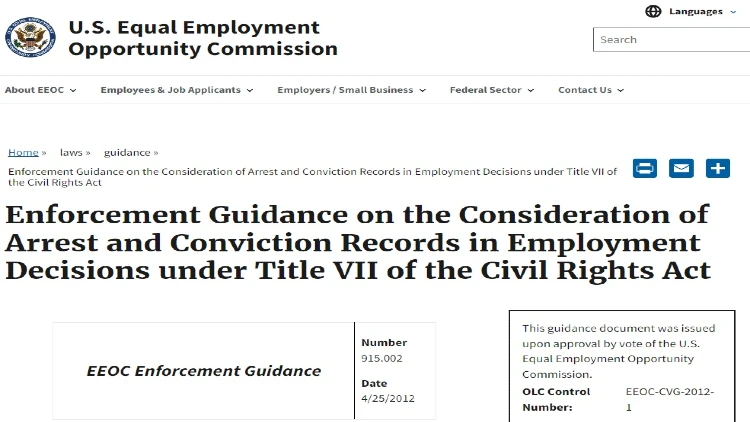
Many states have also passed Ban the Box laws to limit when employers can inquire about a person’s criminal history. Most ban the box laws do not allow a background check until a candidate has been scheduled for an interview or has been extended a conditional offer of employment.
State laws regarding sealing, expunging or pardoning crimes can also help protect an individual with a felony charge by erasing the matter completely from the record, or sealing it from public view. Each state has its own guidelines regarding sealing or expunging records, leading to inquiries about the duration of a felony’s presence on one’s record. Typically, it remains indefinitely unless sealed or expunged by the courts.
That’s why these laws are designed to help those with non-violent felonies get a fresh start.
What To Do if You Find Out Someone or Yourself Is a Felon?
When searching felony records, it’s important to be prepared for what the searcher may find. If the person with the record is a friend, family member or other associate, the searcher will need to decide where to go from there.
For example, if someone is getting to know a new potential love interest, it’s vital to know if that person has been convicted of a felony sex offense as this could pose a danger to the searcher, and discovering if someone is an offender makes a difference.
Also, knowing if someone has a history of other violent offenses can help the person decide if they still want to associate with the individual. Many factors can be considered when making a decision such as the nature of the crime, if there are multiple felony offenses, and how long ago the last offense or conviction was.
Searchers may also uncover felony charges against themselves or may have been accused of a crime that never proceeded to court, leading them to question whether dismissed charges result in a criminal record; typically, the answer is no, but dropped charges present a different scenario altogether.
If the searcher has a felony warrant or charge for themselves on their record, there are steps that should be taken immediately, including:
- Hire an attorney as soon as the charges are discovered if it is pending matters to get the matter resolved as quickly as possible
- Take steps with the courts to have the matter sealed or expunged if the offense is eligible for this type of relief based on the laws in that state
- If the record is in error, discuss with legal counsel to correct the record and remove the potentially negative information
In most cases, an attorney will be a very valuable resource in getting the record sealed, expunged, corrected or disposed of in court.
A felony record can be a huge deterrent when someone is trying to get a job, professional license or housing. This free guide provides steps on how to discover if someone is an offender at no or minimal cost to the person doing the search.
Frequently Asked Questions
Do Felonies Drop Off a Person’s Record After Seven Years?
Felony charges and convictions do not drop off a person’s record after seven years; however, non-convictions may not show up on a background check. Unlike the rules for credit reports or non-convictions, felony convictions can show up regardless of how long ago they occurred.
Are All Sex Offenses Felonies?
When searching the sex offender registry, it’s important to note that not all sex offenses that require registration are felony offenses. Some states have misdemeanor sex offenses that still require registration.
1 Are Arrest Records Public? Can I Check Someone’s Criminal Record? (n.d.). Nolo. Retrieved February 4, 2023, from <https://www.nolo.com/legal-encyclopedia/question-criminal-record-check-another-person-28151.html>
2 Santos, M. (n.d.). Felony vs. Misdemeanors FAQs. Prison Professors. Retrieved February 4, 2023, from <https://prisonprofessors.com/felony-vs-misdemeanors-faqs/>
3 Becker, N. B. (n.d.). Misdemeanor Sex Crimes: Everything You Need to Know. Michigan Sex Crimes Lawyer | CSC Lawyers | Blank Law, PC. Retrieved February 4, 2023, from <https://nicoleblankbecker.com/misdemeanor-sex-crimes-everything-you-need-to-know/>
4 Find a Case (PACER) | United States Courts. (n.d.). U.S. Courts. Retrieved February 4, 2023, from <https://www.uscourts.gov/court-records/find-case-pacer>
5 Federal Inmates By Name. (n.d.). BOP. Retrieved February 4, 2023, from <https://www.bop.gov/mobile/find_inmate/byname.jsp#inmate_results>
6 Online Public District & County Criminal Records Inquiry—Harris County Texas Sheriff’s Office. (n.d.). Online Public District & County Criminal Records Inquiry—Harris County Texas Sheriff’s Office. Retrieved February 4, 2023, from <https://www.harriscountyso.org/JailInfo/FindSomeoneInJail?>
7 Obtaining Arrest Summaries/Detention Letters – LAPD Online. (n.d.). Los Angeles Police Department. Retrieved February 4, 2023, from <https://www.lapdonline.org/obtaining-arrest-summaries-detention-letters/>
8 Methamphetamine Registry. (2022, August 10). Minnesota Public Criminal History. Retrieved February 4, 2023, from <https://chs.state.mn.us/Search/SubmitMorSearch>

